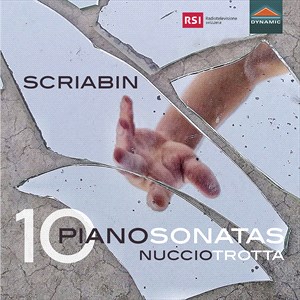
ESSENTIAL RECORDINGS

Piano Sonata No. 1 in F Minor, Op. 6 Piano Sonata No. 2 in G-Sharp Minor, Op. 19, "Sonata-Fantasy" Piano Sonata No. 3 in F-Sharp Minor, Op. 23 Piano Sonata No. 4 in F-Sharp Major, Op. 30 Piano Sonata No. 5, Op. 53 Piano Sonata No. 6 in G Major, Op. 62 Piano Sonata No. 7, Op. 64, "White Mass" Piano Sonata No. 8 in A Major, Op. 66 Piano Sonata No. 9 in F Major, Op. 68, "Black Mass" Piano Sonata No. 10 in C Major, Op. 70
The piano was the instrument of choice for Russian composer Alexander Scriabin (1872-1915), and the Piano Sonata was the world in which he lived and blossomed. Like Chopin, he wrote many Mazurkas, Preludes and Etudes for the piano, all of which are amazing examples of short-form creative bursts, but it is within his Ten Sonatas that Scriabin fully explored and deployed the harmonic universe he created and developed throughout his life. And each and every pianist who has set out to perform or record these monumental pieces, knows that technique alone is not sufficient to master them. From the highly passionate and darkly emotive early sonatas to the volatile, luminous and coruscating final sonata, each one's narrative and spiritual content need to be precisely captured and projected for them to be effective.
Now I will say that I've heard some thrilling accounts of these pieces in the past. For example, the third movement marked Presto of the Sonata No. 1, has been recorded at ludicrous speeds by some, but then pianist Nuccio Trotta's more relaxed approach allows one to hear each and every note clearly. Where Trotta shines is in the more luxuriant passages like the opening movement of the Second Sonata, or in the darker corners of the mysterious No. 6. Nonetheless it takes an intrepid musician to tackle all ten of these at once. His account may be slightly less ostentatious or theatrical than some, but he at least reveals the essence of Scriabin behind each page. In the booklet notes Nuccio Trotta states: "It is our primary duty to leave behind any vanity or showing-off when we approach music. Only then can we hope to be worthy of it." Very well said when you consider all the pianists these days that play eveything faster simply for the sake of velocity, but then don't possess a single musical bone in their body. Recommended ... if you are not all that familiar with the music of Alexander Scriabin, this recording is as good as any to make the first leap.
Jean-Yves Duperron - July 2020